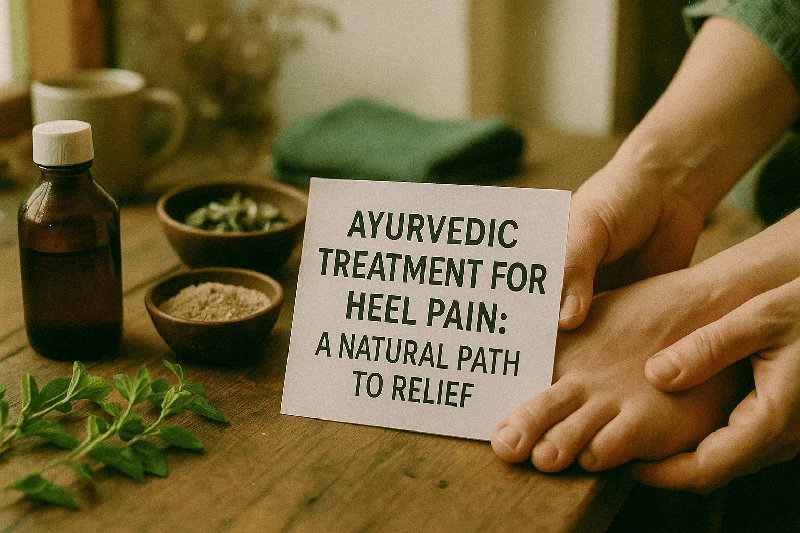Ayurvedic Treatment for Heel Pain: A Natural Path to Relief

Heel pain is a common condition that affects people of all ages, often caused by overuse, poor footwear, or underlying health issues such as plantar fasciitis, Achilles tendinitis, or calcaneal spurs. While modern medicine offers various treatments, Ayurveda provides a holistic and natural approach to alleviating heel pain. This article explores effective Ayurvedic remedies, therapies, and lifestyle practices for managing and relieving heel pain.
Understanding Heel Pain in Ayurveda
In Ayurveda, heel pain is often attributed to an imbalance of the Vata dosha, which governs movement and dryness in the body. The accumulation of Ama (toxins) and weakened Agni (digestive fire) can also contribute to inflammation and stiffness, exacerbating heel pain. Ayurvedic treatments aim to restore balance, reduce inflammation, and strengthen the affected tissues.
Don't wait or self medicate. Start chat with Doctor NOW
Ayurvedic Remedies for Heel Pain
1. Abhyanga (Oil Massage)
Abhyanga involves massaging the affected area with warm, medicated oils to reduce pain and improve circulation. Recommended oils include:
-
Mahanarayan Oil: Known for its anti-inflammatory properties, this oil soothes pain and relieves stiffness.
-
Ksheerabala Oil: Helps in reducing swelling and promoting flexibility.
-
Dhanwantharam Oil: Enhances tissue repair and provides long-lasting relief.
2. Pinda Sweda (Herbal Poultice Therapy)
Pinda Sweda involves applying a warm herbal poultice to the heel to alleviate pain and inflammation. Herbs like Dashamoola, Nirgundi, and Ashwagandha are commonly used for their anti-inflammatory and muscle-relaxing properties.
3. Vasti (Medicated Enema)
Vasti is a detoxification therapy that helps balance Vata dosha. Administering medicated enemas cleanses the system, reducing inflammation and supporting joint health.
4. Herbal Remedies
-
Turmeric: Rich in curcumin, turmeric acts as a natural anti-inflammatory agent.
-
Guggulu: Helps reduce inflammation and strengthens connective tissues.
-
Ashwagandha: Provides relief from stiffness and strengthens muscles.
Dietary Recommendations for Heel Pain
A balanced diet is essential for managing heel pain. Ayurveda recommends the following:
-
Anti-Inflammatory Foods: Include turmeric, ginger, green leafy vegetables, and Amla.
-
Warm and Nourishing Meals: Prefer cooked, easily digestible foods to balance Vata dosha.
-
Hydration: Drink plenty of warm water to flush out toxins.
-
Avoid: Spicy, fried, and processed foods that aggravate inflammation.
Lifestyle Practices for Heel Pain Relief
-
Yoga and Stretching
-
Tadasana (Mountain Pose): Improves posture and strengthens the feet.
-
Vrikshasana (Tree Pose): Enhances balance and stretches the plantar fascia.
-
Downward Dog Pose: Relieves tension in the calves and heels.
-
-
Proper Footwear
-
Wear supportive shoes with cushioned soles.
-
Avoid high heels and flat shoes that lack arch support.
-
-
Foot Soaks
-
Soak your feet in warm water with Epsom salt or herbal decoctions to relieve soreness and improve blood circulation.
-
-
Regular Exercise
-
Engage in low-impact exercises like walking or swimming to maintain mobility without straining the heels.
-
Benefits of Ayurvedic Treatment for Heel Pain
-
Natural and Holistic: Addresses the root cause of heel pain rather than just the symptoms.
-
Non-Invasive: Uses herbal remedies and therapies without harmful side effects.
-
Long-Term Relief: Promotes healing and prevents recurrence by strengthening tissues and improving overall health.
Precautions and Considerations
-
Always consult an Ayurvedic practitioner to determine the most suitable treatment for your condition.
-
Avoid overexertion and give your feet adequate rest during the healing process.
-
Combine Ayurvedic remedies with physical therapy for optimal results.
Conclusion
Ayurvedic treatment for heel pain offers a natural and effective approach to managing and alleviating discomfort. By incorporating therapies like Abhyanga, herbal remedies, and yoga into your routine, you can achieve long-lasting relief and improved mobility. Embrace the holistic wisdom of Ayurveda and take the first step toward pain-free living today!
Got any more questions?
Ask Ayurvedic doctor a question and get a consultation online on the problem of your concern in a free or paid mode.
More than 2,000 experienced doctors work and wait for your questions on our site and help users to solve their health problems every day.

